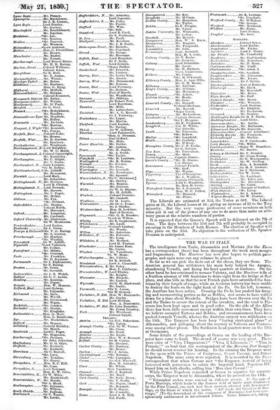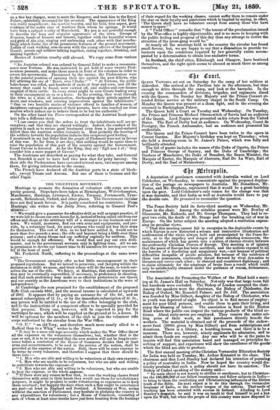THE WAR IN ITALY.
The intelligence from Turin, Alessandria and Mortara (fur the 4nes has a correspondent there) has been throughout the week most meagre and fragmentary. The Moniteur has now also begun to publish para- graphs, and upon none can any reliance be placed.
So far as we can pick the facts out of the chaos, they are these. The •
Austrian general has withdrawn his main body behind the Agogna, abandoning Vereelli, and fixing his head quarters at Garlasco. On'the other hand he has continued to menace Valenta, and the Montleter tells of a fruitless attempt of 100 Austrians to drive eight from the bridge at that place, and also tells us that the new French guns have astonished the Aus- trians by their length of range, while an Austrian battery has been unable to destroy the boats on the right bank of the Po. On his left, however, • the Austrian has been active. Crossing the Po ho has pushed his forag- ing and reconnoitring parties as far as Bobbie, and seems to have settled down for a time about Straddle. Bridges have been thrown over the Po and the Ticino to secure the retreat of the invaders, and the road to Pia- cenza has been kept open and in good order. On the side of the Allies there has been little movement except within their own lines. They have we believe occupied Tortona and Bobbio, and reconnaissances have been pushed towards Vercelli, whence the Austrian outpost was withdrawn on the 19th. The Emperor has been busy "laying strategical plans" at Allessandria, and galloping about the country to Valenta and Pontecu- rone among other places. The Sardinian head quarters were on the 17th at Occimiano.
Some details of the proceedings at Genoa on the landing of the Em-
peror have come to hand. The crowd of course was very great. There were cries of "Viva !'Imperatore!" "Viva 11 Liberatore ! " "Viva la Francis !" so loud that the correspondent of the Morning Post thought he should never recover his hearing. In the evening the Emperor went to the opera with the Prince of Carignano, Count Cavour, and Prince Napoleon. The same cries were repeated. It is recorded by the Times correspondent that when Cavour met "the Emperor, instead of beleg honoured with permission to salute the Imperial hand, Napoleon kissed him on both cheeks, calling him ' Mon cher Cavour !"
While Prince Napoleon reminded at Genoa to organize his separate corps, the Emperor went to Alessandria, where he arrived on the 14th.
" Triumphal arches were Erected in different streets. At the gate of Porta Marengo, which leads to the famous field of battle made illustrious by the First Consul, one arch had been erected, adorned with flowers and flags, on the frieze of which the motto, "All' rengo," (To the descendant of the conqueror of Marone.) lue. riding erode del VuhmuldtobreeduiIa con- spicuously emblazoned in tri-coloured letters. Victor znimal ren g on a fine bay charger, went to meet the Emperor, and took him to the Royal Palace, splendidly decorated for the occasion. The appearance of the King was really magnificent ; his martial bearibg, and his bold; firm aspect, gave evidence of the noble race of warriors frpm whom he _springs._ would have been a subject worthy of Marochetti. My pen is not powerfl enough to describe the busy and, singular appearance of the town. Groups of Zouaves; bands of -hussars and lancers, together with the beautiful women and_girls of,,the city, singing and embracing each other with that noncha- like which forms one of iheprominent features of the present movement. Lakes of rank walking arm-in-arm with the young officers of the Imperial Guard ; priests and soldiers talking together, eating together, drinking, and ridging. together.".
Stories of Austrian cruelty still abound. We copy some from various sourps.
".An Austrian colonel was ordered by General Zobel to make a reconnais- sance near Tortona. He was instructed to get hold of some twenty Pied- montese peasants, and make them march in front of his columns in order to screen his movements. Threatened by the enemy, the Piedmontese were in the painful position of opening their fire against the poor fellows, who fell uttering the cry of • Bravi, viva l'Italia!' " " At Tortona, the public bake-house was rifled, and hundreds of sacks of flour and corn, and all the money that could be found, were carried off, and stables and cow-houses emptied of their cattle. In every street might be seen Croats leading away to their encampment an ox or a horse. In the evening, they went through the in: a, state of intoxication, discharging their pistols against the dUrt-rs- and windows, 'and uttering imprecations against the inhabitants." "One or two horrible stories of violence offered to families of women, of daughters outraged in presence of their parents, have also reached me from sources which induce me to believe them to be but too authentic."
On the other hand the Times correspondent at the Austrian head-quar- ters tells a different story. " Lean assure you that the orders to treat the inhabitants well are pe- remptory, and that they are obeyed willingly. Indeed, the conduct of the natives is such as to secure good treatment even from a less good-natured fellow than the Austrian soldier Certainly is. Most probably the bearing of • the soldiery towards the population induces this reciprocal good feeling. . . . I mentioned in my last letter that the people of Piedmont were not in favour of this war. So far from it are they that nothing would be easier than to raise the population of this part of tie country against the Government. Count Cavour is detested. As for the King, they say Egli non e re ; ' they consider him a mere puppet of Cavour." The Austrians are described as paying for what they take, and General yOn. Benedek is said to have had two men shot for petty larceny. On their side the Piedmontese have executed several men, two mayors among them, for giving information to the enemy. The French have declared all the Austrian ports in a state of block- ade, except Trieste and Ancona. But one of these is German and the other- Papal.



























 Previous page
Previous page